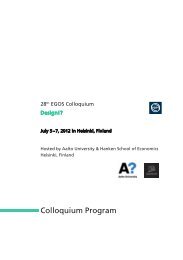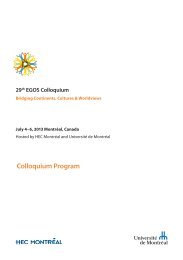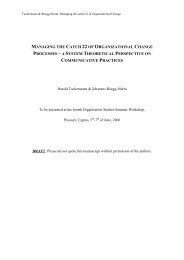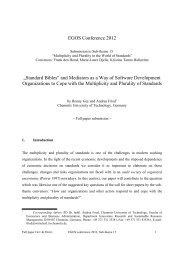A single set of standards and the multiplicity of interpretations - EGOS
A single set of standards and the multiplicity of interpretations - EGOS
A single set of standards and the multiplicity of interpretations - EGOS
Create successful ePaper yourself
Turn your PDF publications into a flip-book with our unique Google optimized e-Paper software.
family. Some <strong>of</strong> <strong>the</strong> problems may differ between language-pairs while o<strong>the</strong>rs may be more<br />
“generic” <strong>and</strong> may also appear in translation between language-pairs o<strong>the</strong>r than English-Finnish 3 .<br />
For instance, <strong>the</strong> given terminological differences that are discussed in this section may be<br />
specific to Finnish. Yet <strong>the</strong> differences in conceptual systems are one <strong>of</strong> <strong>the</strong> main concerns in<br />
translation between any language pairs.<br />
Three main categories <strong>of</strong> problems <strong>of</strong> translation were explored during <strong>the</strong> interviews: first,<br />
differences in <strong>the</strong> conceptual systems; second, problems <strong>of</strong> interpreting <strong>the</strong> meaning <strong>of</strong> <strong>the</strong><br />
original text even when <strong>the</strong> text only included familiar terms <strong>and</strong> third, partly related to <strong>the</strong><br />
previous two issues, <strong>the</strong> pr<strong>of</strong>essional translator’s lack <strong>of</strong> accounting knowledge. The importance<br />
<strong>of</strong> expertise in <strong>the</strong> substance field for <strong>the</strong> translation <strong>of</strong> <strong>the</strong> <strong>st<strong>and</strong>ards</strong> also has bearings on <strong>the</strong><br />
translation policies which is fur<strong>the</strong>r discussed in section 5.<br />
4.1 Terminology<br />
4.1.1 Between-language Differences in Conceptual Systems<br />
The level <strong>of</strong> equivalence between discipline specific terms in <strong>the</strong> source language <strong>and</strong> target<br />
language is one <strong>of</strong> <strong>the</strong> main concerns when translating pr<strong>of</strong>essional text such as IFRS <strong>st<strong>and</strong>ards</strong>.<br />
In order to underst<strong>and</strong> <strong>the</strong> meaning <strong>of</strong> disciplinary terms (<strong>and</strong> how knowledge is organized within<br />
<strong>the</strong> discipline), one needs to underst<strong>and</strong> <strong>the</strong> interrelationship between different terms <strong>and</strong><br />
concepts, in o<strong>the</strong>r words, how concepts are organized into concept systems. Moreover, IASB<br />
requires that each source language term is always translated with <strong>the</strong> same target language term<br />
(Terms <strong>of</strong> Reference) <strong>and</strong> any exception from this rule needs to be justified. This word-for-word<br />
requirement emphasizes formal equivalence or what IASB terms “consistency” <strong>of</strong> <strong>the</strong> translation.<br />
As <strong>the</strong> meaning <strong>of</strong> words in determined by <strong>the</strong> context, <strong>the</strong> procedure does not ensure that <strong>the</strong><br />
translation conveys <strong>the</strong> essential thought <strong>of</strong> <strong>the</strong> original text (i.e. dynamic equivalence)<br />
3 I have conducted some more interviews after writing this section <strong>and</strong> <strong>the</strong> interviewees representing o<strong>the</strong>r languages<br />
mentioned <strong>of</strong>ten <strong>the</strong> same problematics as <strong>the</strong> Finnish ones.<br />
13









